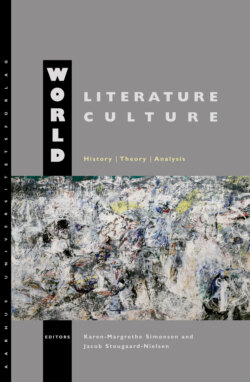Читать книгу World Literature, World Culture - Группа авторов - Страница 5
На сайте Литреса книга снята с продажи.
TRANSLATIONS
ОглавлениеAccording to Damrosch, world literature is writing that gains in translation (281). From a traditional national perspective, this observation seems counter-intuitive. Any literary work, one would think, must surely lose some of its linguistic expressiveness and meaningful cultural references when it is translated and circulated in a different culture; translation can offer at best an inferior, at worst a distorted copy of the original. From a national perspective, indeed, a translator is seen as a traitor (Larsen 245). But from the perspective of world literature, the opposite is true: here, the translator is the hero, a central actor in the world of letters. She acts not only as a “cosmopolitan intermediary”, in Casanova’s terms, but also, as Goethe recognized, creates literary value by her work (Casanova 21, 14). Literature not only survives in translation but gains new meanings and relevance every time it crosses geographical, cultural and linguistic borders. Goethe held the work of translation in high esteem, regarding it as one of the most essential aspects of international trade. Without translation the global economy would be brought to a standstill, there would be no such thing as globalisation to talk and write about; nor, by the same token, would there be any world or even national literatures. Given the centrality of the international market to the dynamics of globalisation it is not surprising that translation studies have come to occupy a central role in studies of world literature.
Translation, both in the limited sense referring to the transfer of material from one language to another, and in the more general sense denoting the dynamic of any intercultural exchange, is perhaps more important today than ever before. A great many professional translators nowadays risk their lives in theatres of war amidst ethnic unrest, and the massive movement of peoples around the globe has perforce made translators out of numerous ordinary people displaced by war, repressive governments, economic and environmental catastrophes, or just seeking a better, more adventurous life. Both the professional translator and the multilingual migrant see the world constantly from more than one perspective, and in this sense they may be considered central figures in the globalised world literature of today (see Susan Bassnett).
This elliptical, bifocal view of literature and culture reveals translation to be at the very centre of the construction of national cultures and literary canons. In a Europe in which new regional identities, new states and unions are emerging from the geographies of the old nation-states, translations of foreign literature may come to replace national or regional source texts as the core ingredients of new national and regional identities, as happened with the formation of a Belgian literary canon in the nineteenth century (see Karen Vandemeulebroucke).
The notion that world literature is writing that gains in translation is also useful when considering translation in its broadest sense. Translation is also at work, for example, when historical events are “translated” into personal witness accounts that employ specific narrative structures; such accounts may even function as a means of coping with the present through therapeutic rewritings of the past (see Michel De Dobbeleer). In the perspectives on world literature presented in this section, translation is seen fundamentally as the creative rewriting of past texts and events, rather than as an attempt to represent a given source transparently. Such is also the case in Jean-Luc Godard’s film Histoire(s) du Cinéma, where intertextual references and filmic montage recall the Holocaust without attempting to represent or rationalize it. Indeed, from a world literature perspective montage, as a particular strategy of translation, may be considered an ethical way of producing meaning, involving what Damrosch has called a “detached engagement” with the events and texts of the past (see Miriam Heywood).
